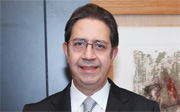 Blominvest is trying to build a funds business in Lebanon, a nation where the appetite for funds is low. The firmâs head of asset management tells George Mitton how its growth plans rely on neighbouring states.
Blominvest is trying to build a funds business in Lebanon, a nation where the appetite for funds is low. The firmâs head of asset management tells George Mitton how its growth plans rely on neighbouring states.
What do you do if you run an asset management business in a country where few people play the stock market and the demand for mutual funds has yet to grow?
This was the challenge faced by Michel Chikhani when Blominvest, an offshoot of Blom Bank, launched an asset management unit in 2008 with him in charge.
Blominvest is based in Lebanon, a country of four million people with a market capitalisation on its stock exchange of about $10 billion. In 2011, there were only 61 transactions a day with an average value of a mere $2.1 million. There are only a handful of companies listed and they are nearly all banks.
Like the stock market, the Lebanese funds industry is still at the early stages of growth. Data provider Zawya lists just eleven operational mutual funds domiciled in Lebanon, from only two providers: Blominvest and Bank of Beirut.
One of the reasons funds have yet to take off in Lebanon is that the interest rates offered by banks are very high. “When you have the possibility of 5% on your US dollars and 7% on a pegged currency, the Lebanese pound, you don’t really look at asset management,” says Chikhani.
Faced with this challenge, Chikhani did what any reasonable person would: he looked to some of his large and wealthy nearby states and tried to establish operations there.
Blominvest set up an investment company in Saudi Arabia in 2010 and launched its first product in the country, a Saudi Arabian equity fund, in July 2011. The company is waiting for approval from the Saudi regulator for its second fund from Saudi – a Mena balanced fund – and Chikhani says the launch is likely to happen in June or July. Later in the year, Blominvest hopes to launch an Islamic fund from Saudi.
Saudi Arabia is a much bigger country than Lebanon, with a population of 27 million, huge oil revenues and a stock exchange with a market capitalisation of $366 billion, as of May. In addition, interest rates offered by banks are low, unlike in Lebanon.
“Lebanon is a small country with small companies,” says Chikhani. In Saudi Arabia, rates on deposits are lower and the equity market is deeper. “It’s a different type of model.”
Chikhani says clients of Blominvest’s Saudi equity fund are mainly retail and high-net-worth. The firm is also looking to attract institutional money. In either case, he is hoping the Saudi operation will drive growth for the business in the coming years.
Had political events in the past two years gone differently, though, Chikhani might have been looking to another market besides Saudi. Blominvest had plans to set up an asset management business in Egypt, regulated by the local authorities, which could attract Egyptian institutional investors.
Unfortunately, the Egyptian revolution in 2011 got in the way and Chikhani is not sure when the country will be stable enough to restart these plans.
Had the launch gone ahead, Blominvest would have hoped to build on its existing Egypt fund, Pyramids, which it runs from Beirut. The product is a balanced fund that invests half its portfolio in Egyptian equities and half in Egyptian government and corporate bonds.
From Beirut, the company also runs a balanced fund for Jordan named Petra, after the ancient stone city, and a balanced fund for Lebanon named Cedar, after its national emblem. In addition, it runs a money market fund and a bond fund that invests mainly in Lebanese debt instruments.
Not all the balanced funds are equally balanced, though. Because the Beirut stock exchange is so small, Blominvest capped the Cedar fund at only 25% of the portfolio in Lebanese equities and the rest in Lebanese government and corporate bonds. Chikhani says there are between $30 billion and $40 billion in Lebanese bonds, compared with a stock market capitalisation of $10 billion.
“An equal balance would place an effort on portfolio managers to perform in a market where there may be no liquidity,” he says. “It doesn’t make sense.”
Chikhani hopes that with time, the Beirut Stock Exchange will become more active. The country recently passed a law to establish a capital market authority, which Lebanon has lacked. There are a number of privatisations that have been in the pipeline for some time. If these go ahead, the number of listed stocks would rise. Chikhani is hopeful but says one should not expect change to come too quickly, drily quoting the saying, “In Europe, they have watches. Here, we have time”.
Chikhani, who is Lebanese, knows Europe well. When he first visited Paris, “I went for two weeks and stayed ten years”. His work included a spell at CDC Ixis Asset Management, where he was in the alternatives department, working on commodity trading advisor and overlay hedging strategies.
He returned to Lebanon in 2000 and worked in the asset management business for Bank of Beirut until 2007, when he moved to Blominvest. Now, he has big plans for the company to be a serious funds house. “We’re not there just to be wealth managers or private bankers,” he says. “The purpose is for Blominvest to be a real player in asset management.”
©2012 funds global
